It looks like you're using an Ad Blocker.
Please white-list or disable AboveTopSecret.com in your ad-blocking tool.
Thank you.
Some features of ATS will be disabled while you continue to use an ad-blocker.
share:
I'll add more to this sometime when I have time.
I have some more concepts to introduce, a couple more myths to share, and some symbols to compare that I'm sure will have everyone thinking very deeply.
I have not even hardly begun to post my best stuff yet....
I have some more concepts to introduce, a couple more myths to share, and some symbols to compare that I'm sure will have everyone thinking very deeply.
I have not even hardly begun to post my best stuff yet....
Please watch this short but extremely informative video about the bronze statue of Fortuna as the Caduceus that I posted earlier...
It's very powerful...
It's very powerful...
I keep adding a few dozen points to my ever growing list of stuff to post in this thread...
I just need to post some of it.
Sigh...
lol
I just need to post some of it.
Sigh...
lol
a reply to: Raven_Heart
Holy #, lol.
Ok I've been working on all sorts of stuff to add to this thread, and it gets crazy. I'll be able to write it all in seamlessly with everything else and continue repeating all the motifs in an impossible web...
Anyways get this...
YOU were Destined to come into this thread.
Everything I am researching for this thread Converges onto...

I completed the cycle.
It will take me many pages to write out the entire Spiritual Odyssey I've been on the last week.
This might all seem random but it cannot be, the odds are so astronomical.
I already thought it was a "neat coincidence" that your Profile says "Dreamwalker", "Spiralling Inwards", and "Insomniac", and your quotes are very interesting as well...
But this...
It's like we're falling into a singularity and time space (including symbolism, themes, ideas themselves) are merging and swirling together...
Who are you??
Hahaha you're gonna flip when you see how this all leads to "Raven Heart"...
You might even be the only person who's even been reading this too!!
Impossible!!!
I am so freakin out here...

Holy #, lol.
Ok I've been working on all sorts of stuff to add to this thread, and it gets crazy. I'll be able to write it all in seamlessly with everything else and continue repeating all the motifs in an impossible web...
Anyways get this...
YOU were Destined to come into this thread.
Everything I am researching for this thread Converges onto...

I completed the cycle.
It will take me many pages to write out the entire Spiritual Odyssey I've been on the last week.
This might all seem random but it cannot be, the odds are so astronomical.
I already thought it was a "neat coincidence" that your Profile says "Dreamwalker", "Spiralling Inwards", and "Insomniac", and your quotes are very interesting as well...
But this...
It's like we're falling into a singularity and time space (including symbolism, themes, ideas themselves) are merging and swirling together...
Who are you??
Hahaha you're gonna flip when you see how this all leads to "Raven Heart"...
You might even be the only person who's even been reading this too!!
Impossible!!!
I am so freakin out here...

a reply to: Raven_Heart
It's so Unreal and Surreal.
I was like "hey wait a minute... isn't that the person who responded in my thread?"
Then I came back and checked to make sure.
And this was the last piece too, I was like "after this I need to wrap it up and move onto the next thread"....
It's Uncanny. I didn't intend for this at all.
It is 100% pure coincidence and random - it was literally where everything leads.
When you see how I arrive at this your mind will melt.
Mine is right now.
Unbelievable....
It's so Unreal and Surreal.
I was like "hey wait a minute... isn't that the person who responded in my thread?"
Then I came back and checked to make sure.
And this was the last piece too, I was like "after this I need to wrap it up and move onto the next thread"....
It's Uncanny. I didn't intend for this at all.
It is 100% pure coincidence and random - it was literally where everything leads.
When you see how I arrive at this your mind will melt.
Mine is right now.
Unbelievable....
edit on 7/5/2017 by muzzleflash because: (no reason given)
Thought you might like to know that there's at least one other person, besides Raven_Heart, still following this thread...
a reply to: lostgirl
Ohh? Awesome!!
That's so cool.
So that's 2 definitely.
I need to add some more tonight, I've got a few hours and I'm into it.
And here, since I'm inspired with a creative license and I accidentally linked Raven's name into where all of this is heading (and didn't even realize it was gonna happen it just did), I will purposely link your name in a funny way that I just thought of.
Since you're the Lost Girl deciding if you want to walk through that big doorway, I'm gonna issue you a

and say walk on through to the
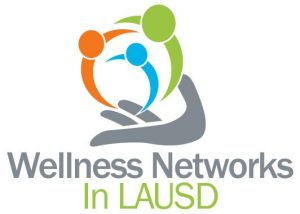
Hahaha...
I was like "How can I spell 'Lost' without spelling it the same yet ensure it still sounds the same?
And since this threads taken the theme of an Academy of Angels, it seems fitting that I'd use LAUSD (Los Angeles Unified School District) as LA literally means "The Angels"...
Ok, well...erm...
I'll find something in my mountain of notes to post and continue this wild ride into the netherrealms of our minds...
Thank you btw.
Ohh? Awesome!!
That's so cool.
So that's 2 definitely.
I need to add some more tonight, I've got a few hours and I'm into it.
And here, since I'm inspired with a creative license and I accidentally linked Raven's name into where all of this is heading (and didn't even realize it was gonna happen it just did), I will purposely link your name in a funny way that I just thought of.
Since you're the Lost Girl deciding if you want to walk through that big doorway, I'm gonna issue you a

and say walk on through to the

Hahaha...
I was like "How can I spell 'Lost' without spelling it the same yet ensure it still sounds the same?
And since this threads taken the theme of an Academy of Angels, it seems fitting that I'd use LAUSD (Los Angeles Unified School District) as LA literally means "The Angels"...
Ok, well...erm...
I'll find something in my mountain of notes to post and continue this wild ride into the netherrealms of our minds...
Thank you btw.
Ok I got an hour to post, so I can't really make anything too fancy at the moment. So let's just go over some symbols that will increasingly come into
play and (in many ways) have already been in play throughout the entire thread.

This is a simple dreamcatcher with the Triquetra in the center of the three Borromean Rings.
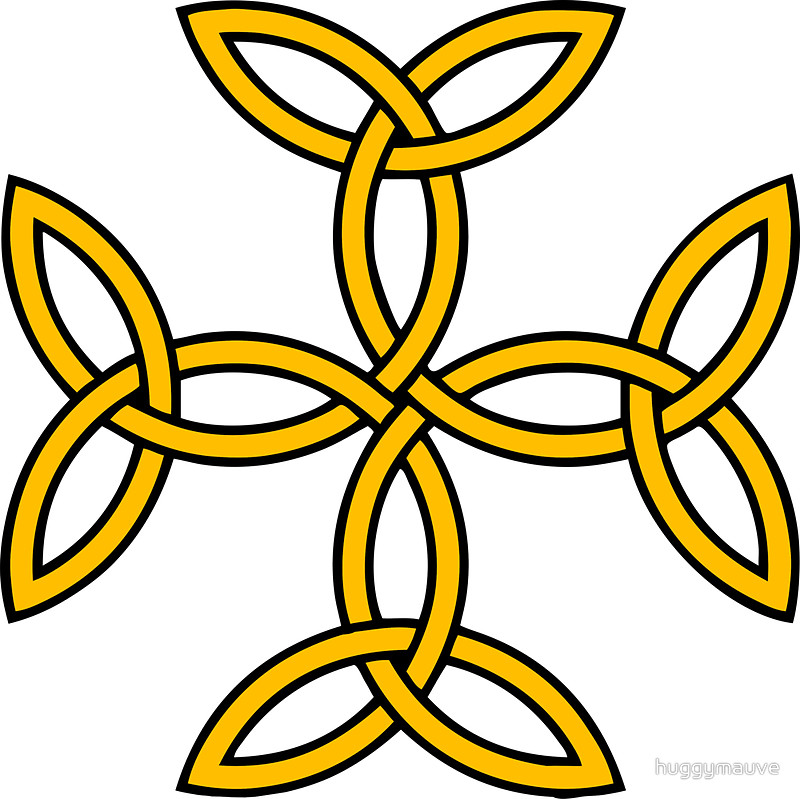
That is the Carolingian Cross of Charlemagne, it is 4 Triquetras linked.
When placed into a circle it becomes the basic Celtric Cross.

This is a logo of the popular TV series Charmed, it's obviously about 3 incredibly powerful witches who fight demons and warlocks, etc. The first episode was "Something Wicca This Way Comes", which is a play on an important clue that will come up again later.
The themes, motifs, characters, episode titles, etc, in this series are a really good guide for doing research on a lot of esoteric and historical topics. It actually became the center of a study about "The Magic Power of TV" because it developed a large cult following and kept people glued to the tube Religiously. They were literally "Charmed" by this show's "Illusion". I'd wager less than 1% did any research to use this as a base for learning new concepts.
If you did watch it and look into the things referenced, than you were

We'll come back to 4 leaf clovers later (another symbol of luck).
Here are two other symbols they used of interest

and
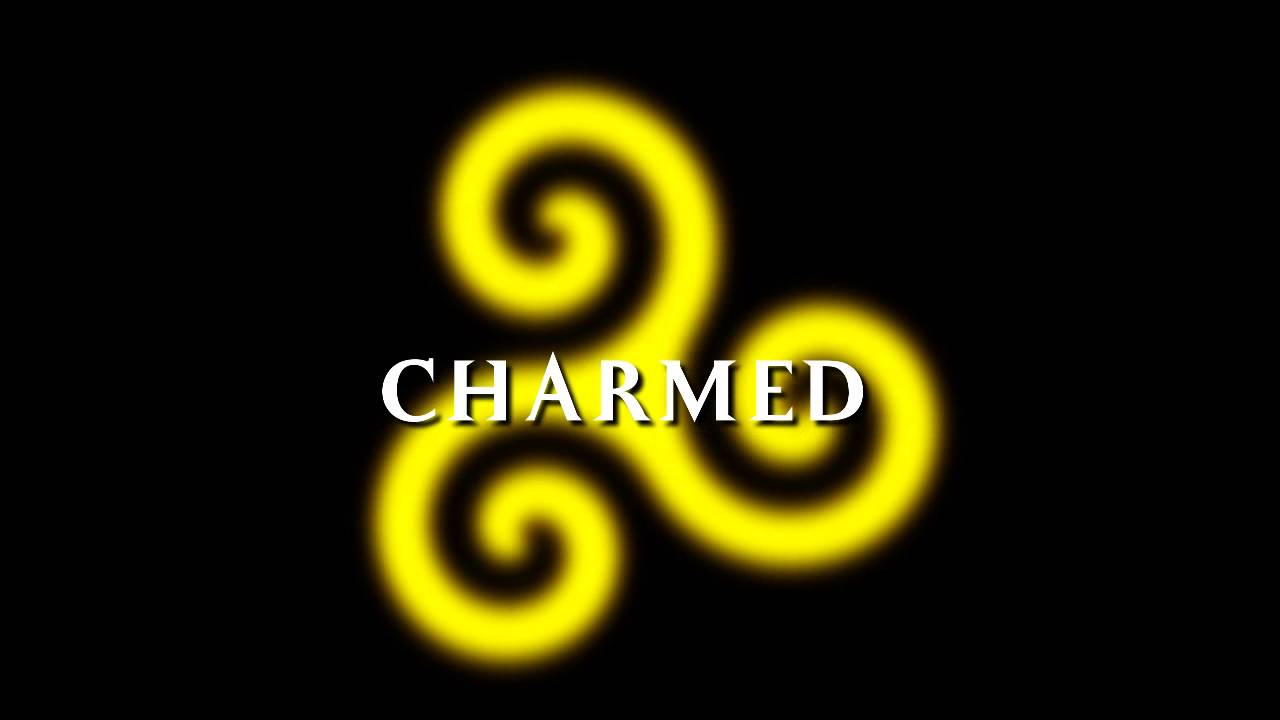
So we have the Triskelion , which generally references the same concepts (just check these wikis I'm linking for a cursory glance).
And the flower is again popularly symbolized in the symbol of France, the modern territory where a lot of these symbols have been used historically. Fleur-de-lis

So you can see the typical Christian Cross is actually a winged pole or staff.
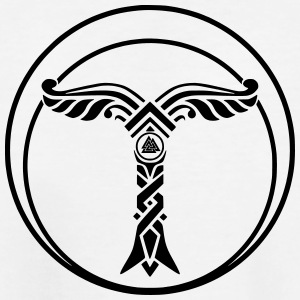
This, above, is the Irminsul. It means "Arising Pillar" and is connected to Odin. Despite their confusion, I'm here to tell you it is the World Tree AND the Midgard Serpent combined. And of course it's the Caduceus.

And this triple triangle symbol is the Valknut
The Valknut is in the middle of the larger triangle.
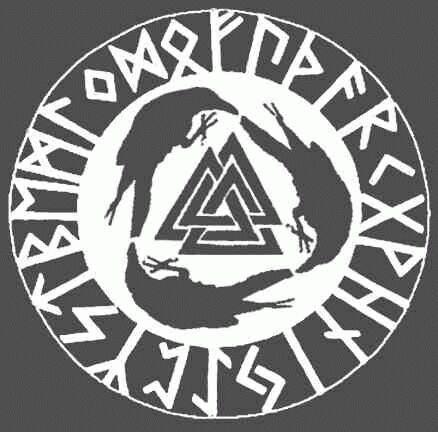
Here it is in the Wheel of Fortune / Time.

Here it is inside the "Horns of Odin".
So these are some basic
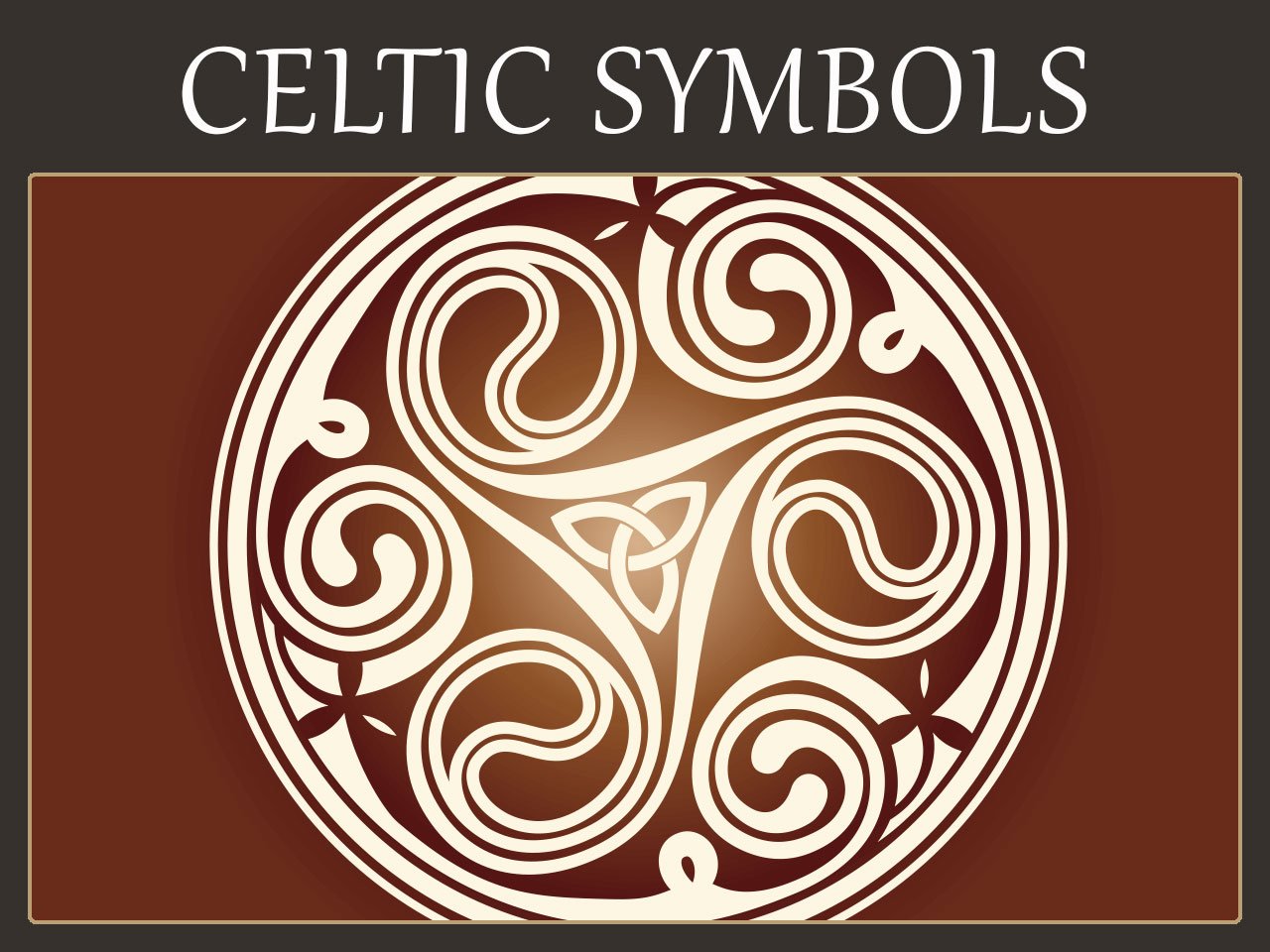
But they are also used all over the place elsewhere in different styles.
For example the Christian Universalist Church uses a variant of the Triquetra inside a Triangle and a Circle.

This is a simple dreamcatcher with the Triquetra in the center of the three Borromean Rings.

That is the Carolingian Cross of Charlemagne, it is 4 Triquetras linked.
When placed into a circle it becomes the basic Celtric Cross.

This is a logo of the popular TV series Charmed, it's obviously about 3 incredibly powerful witches who fight demons and warlocks, etc. The first episode was "Something Wicca This Way Comes", which is a play on an important clue that will come up again later.
The themes, motifs, characters, episode titles, etc, in this series are a really good guide for doing research on a lot of esoteric and historical topics. It actually became the center of a study about "The Magic Power of TV" because it developed a large cult following and kept people glued to the tube Religiously. They were literally "Charmed" by this show's "Illusion". I'd wager less than 1% did any research to use this as a base for learning new concepts.
If you did watch it and look into the things referenced, than you were

We'll come back to 4 leaf clovers later (another symbol of luck).
Here are two other symbols they used of interest

and

So we have the Triskelion , which generally references the same concepts (just check these wikis I'm linking for a cursory glance).
And the flower is again popularly symbolized in the symbol of France, the modern territory where a lot of these symbols have been used historically. Fleur-de-lis

So you can see the typical Christian Cross is actually a winged pole or staff.

This, above, is the Irminsul. It means "Arising Pillar" and is connected to Odin. Despite their confusion, I'm here to tell you it is the World Tree AND the Midgard Serpent combined. And of course it's the Caduceus.

And this triple triangle symbol is the Valknut
The Valknut is in the middle of the larger triangle.

Here it is in the Wheel of Fortune / Time.

Here it is inside the "Horns of Odin".
So these are some basic

But they are also used all over the place elsewhere in different styles.
For example the Christian Universalist Church uses a variant of the Triquetra inside a Triangle and a Circle.
Ok go back up and look at the Irminsul again, it can represent everything. So can the triquetra.
The Circle tells me it represents Everything.
The Tree is the World Tree, the Serpent is Knowledge.
So each of these symbols is interchangeable, and they represent the entire Universe.
They represent YOU, and explain how your psycho-spiritual-physical existence operates.
They explain the 'roadmap' or 'key' or 'Legend' so that you can understand your own Atlas of yourself and the Cosmic reality you find yourself experiencing right now.
Here's how I know this and can prove it:
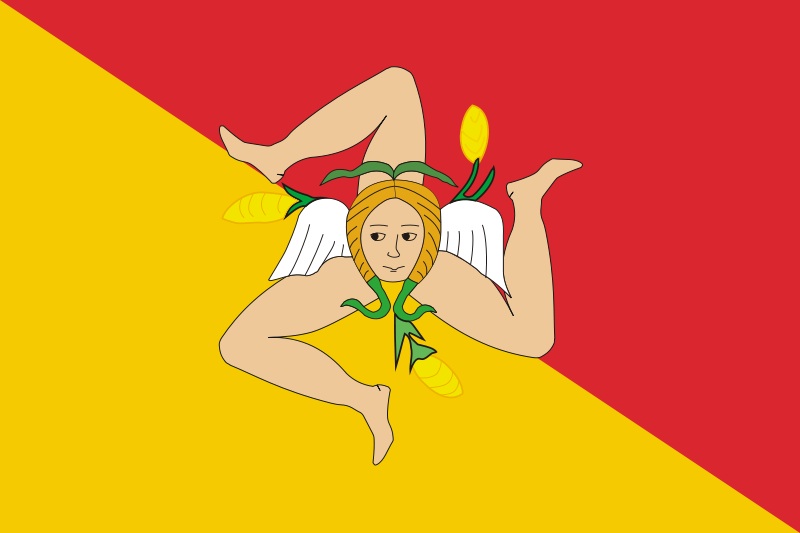
So it's the "LEG-END", which is the KEY to understanding what the symbols of the map mean. The face even has wings on it. We even have Red and Gold colors playing into it. I'm talking Alchemy here...
These symbols each independently explain how everything works in life, all this stuff I'm talking about in the thread, and can aid you in figuring out everything else...
The Circle tells me it represents Everything.
The Tree is the World Tree, the Serpent is Knowledge.
So each of these symbols is interchangeable, and they represent the entire Universe.
They represent YOU, and explain how your psycho-spiritual-physical existence operates.
They explain the 'roadmap' or 'key' or 'Legend' so that you can understand your own Atlas of yourself and the Cosmic reality you find yourself experiencing right now.
Here's how I know this and can prove it:

So it's the "LEG-END", which is the KEY to understanding what the symbols of the map mean. The face even has wings on it. We even have Red and Gold colors playing into it. I'm talking Alchemy here...
These symbols each independently explain how everything works in life, all this stuff I'm talking about in the thread, and can aid you in figuring out everything else...
Ok so if these symbols are in reality maps of the "WORLD" and the "LEGEND" is telling YOU about YOURSELF and how to figure out yourself, how can I
fact check myself?
Well first of all, the World Whirled.
It moves around, rotates, turns, revolves, spins, circles, spirals, or cycles.
These are the cycles of existence, the wheel of time, fortune (as in your FATE), etc.
Etymology World
Atlas holds the "WORLD" or "COSMOS" on his shoulders, because he's a Tree and the "World", our Life, is the branches and the sprouting blossoms of the Flower of Life.
So the Cosmos is the World of Man, and that which is Under the Sun (Son).
"Map symbolization is the characters, letters, or similar graphic representations used on a map to indicate an object or characteristic in the real world."
"Combining science, aesthetics, and technique, cartography builds on the premise that reality can be modeled in ways that communicate spatial information effectively."
So maps need to:
1) Orchestrate the elements of the map to best convey its message to its audience.
2) Reduce the complexity of the characteristics that will be mapped.
3) Set the map's agenda and select traits of the object to be mapped.
I used the Cartography and Map Symbolization wikis for that.
So the Legends are the Keys.
I gotta turn off my laptop and run now.
I'll try to put up a lot of posts tomorrow if possible.
I got tons of work to do on other things as well, so we'll see.
Well first of all, the World Whirled.
It moves around, rotates, turns, revolves, spins, circles, spirals, or cycles.
These are the cycles of existence, the wheel of time, fortune (as in your FATE), etc.
Etymology World
Old English woruld, worold "human existence, the affairs of life," also "a long period of time," also "the human race, mankind, humanity," a word peculiar to Germanic languages (cognates: Old Saxon werold, Old Frisian warld, Dutch wereld, Old Norse verold, Old High German weralt, German Welt), with a literal sense of "age of man," from Proto-Germanic *wer "man" (Old English wer, still in werewolf; see virile) + *ald "age" (from PIE root *al- (2) "to grow, nourish").
Atlas holds the "WORLD" or "COSMOS" on his shoulders, because he's a Tree and the "World", our Life, is the branches and the sprouting blossoms of the Flower of Life.
Originally "life on earth, this world (as opposed to the afterlife),"
Middangeard (Old Norse Midgard), literally "the middle enclosure" (see yard (n.1)), which is rooted in Germanic cosmology. Greek kosmos in its ecclesiastical sense of "world of people" sometimes was rendered in Gothic as manaseþs, literally "seed of man."
the Lithuanian word is pasaulis, from pa- "under" + saule "sun."
So the Cosmos is the World of Man, and that which is Under the Sun (Son).
"Map symbolization is the characters, letters, or similar graphic representations used on a map to indicate an object or characteristic in the real world."
"Combining science, aesthetics, and technique, cartography builds on the premise that reality can be modeled in ways that communicate spatial information effectively."
So maps need to:
1) Orchestrate the elements of the map to best convey its message to its audience.
2) Reduce the complexity of the characteristics that will be mapped.
3) Set the map's agenda and select traits of the object to be mapped.
I used the Cartography and Map Symbolization wikis for that.
So the Legends are the Keys.
I gotta turn off my laptop and run now.
I'll try to put up a lot of posts tomorrow if possible.
I got tons of work to do on other things as well, so we'll see.
On my phone now....
Ok this is crazy, get this:
Everyone's giving me stuff for free now. Well, I did pay my phone bill from Sprint because they are making a run for my money but mostly I'm lucking out.
There was this 300$ bonus that they said would take 6 to 8 weeks to get, but I got it on the third day (Monday) which was so incredibly important as I was almost broke again and was late on my phone bill.
At Panera they didn't charge me, they just gave it to me. Never seen this girl before.
Then at the gas station, I got free stuff twice, on Monday and just a few minutes ago. Different guys. They were just like "it's cool you're good".
And I got free dinner at ChicfilA tonight too. I don't even know that guy either. He just let me have it!!
This is clearly impossible statistically - almost. I'll explain the quantum physics behind this later in the thread, or rather - I'll let one of the smartest physicists ever - Michio Kaku - explain it.
By the way he's super cool too, I used to talk to him when I was in college in 2000. He would let me ask all sorts of questions and he seemed genuinely concerned about my life and future. He's a real Good Guy and super smart.
Anyhow, all this incredibly good "luck" does not seem like a random coincidence.
It'll be raining like crazy and I just walk outside and it stops immediately. The winds blowing in the perfect directions, everything. It's been raining all week and this keeps happening. I barely get wet. The timing is unbelievable!!
It's almost as if......
Ok this is crazy, get this:
Everyone's giving me stuff for free now. Well, I did pay my phone bill from Sprint because they are making a run for my money but mostly I'm lucking out.
There was this 300$ bonus that they said would take 6 to 8 weeks to get, but I got it on the third day (Monday) which was so incredibly important as I was almost broke again and was late on my phone bill.
At Panera they didn't charge me, they just gave it to me. Never seen this girl before.
Then at the gas station, I got free stuff twice, on Monday and just a few minutes ago. Different guys. They were just like "it's cool you're good".
And I got free dinner at ChicfilA tonight too. I don't even know that guy either. He just let me have it!!
This is clearly impossible statistically - almost. I'll explain the quantum physics behind this later in the thread, or rather - I'll let one of the smartest physicists ever - Michio Kaku - explain it.
By the way he's super cool too, I used to talk to him when I was in college in 2000. He would let me ask all sorts of questions and he seemed genuinely concerned about my life and future. He's a real Good Guy and super smart.
Anyhow, all this incredibly good "luck" does not seem like a random coincidence.
It'll be raining like crazy and I just walk outside and it stops immediately. The winds blowing in the perfect directions, everything. It's been raining all week and this keeps happening. I barely get wet. The timing is unbelievable!!
It's almost as if......
Here's how crazy I am:
Ok so World in OE is Woruld?
Take out the "r", it's Would.
Phonetic homonym - Wood.
So World = Wood?
Yes! It's the World Tree of Thee!
This must be why one of the elements in some (mostly Asian) systems is Wood.
There's no way I'm smart enough to figure this out with my own logic - it's like I Woo'd Wodin.
Let's do a 1minute fact check since I'm on the phone:
Etymology Would=
"Old English wolde, past tense and past subjunctive of willan "to will" (see will (v.)). Would-be (adj.) "wishing to be, vainly pretending" is first recorded c. 1300."
Will? Wheel!!
Will=
1)
"Old English *willan, wyllan "to wish, desire; be willing; be used to; be about to" (past tense wolde)"
2)
"Old English will, willa "mind, determination, purpose; desire, wish, request; joy, delight,"
3)
"Determine by act of choice"
Wood=
2) Mad, insane, frenzied, possesed.
"from PIE *wet- (1) "to blow; inspire, spiritually arouse;" source of Latin vates "seer, poet," Old Irish faith "poet;" "with a common element of mental excitement" [Buck]. Compare Old English woþ "sound, melody, song," Old Norse oðr "poetry," and the god-name Odin."
Wheel=
2) "reduplicated form of root *kwel- (1) "revolve, move round; sojourn, dwell.""
Dwell? This is swell can't ya tell?
This gets even weirder....
Ok so World in OE is Woruld?
Take out the "r", it's Would.
Phonetic homonym - Wood.
So World = Wood?
Yes! It's the World Tree of Thee!
This must be why one of the elements in some (mostly Asian) systems is Wood.
There's no way I'm smart enough to figure this out with my own logic - it's like I Woo'd Wodin.
Let's do a 1minute fact check since I'm on the phone:
Etymology Would=
"Old English wolde, past tense and past subjunctive of willan "to will" (see will (v.)). Would-be (adj.) "wishing to be, vainly pretending" is first recorded c. 1300."
Will? Wheel!!
Will=
1)
"Old English *willan, wyllan "to wish, desire; be willing; be used to; be about to" (past tense wolde)"
2)
"Old English will, willa "mind, determination, purpose; desire, wish, request; joy, delight,"
3)
"Determine by act of choice"
Wood=
2) Mad, insane, frenzied, possesed.
"from PIE *wet- (1) "to blow; inspire, spiritually arouse;" source of Latin vates "seer, poet," Old Irish faith "poet;" "with a common element of mental excitement" [Buck]. Compare Old English woþ "sound, melody, song," Old Norse oðr "poetry," and the god-name Odin."
Wheel=
2) "reduplicated form of root *kwel- (1) "revolve, move round; sojourn, dwell.""
Dwell? This is swell can't ya tell?
This gets even weirder....
Dwell=
"Old English dwellan "to mislead, deceive," originally "to make a fool of, lead astray," from Proto-Germanic *dwelan "to go or lead astray" (source also of Old Norse dvöl "delay," dvali "sleep;""
I must be dreaming...
"Middle Dutch dwellen "to stun, make giddy, perplex;" Old High German twellen "to hinder, delay;" Danish dvale "trance, stupor," dvaelbær "narcotic berry," source of Middle English dwale "nightshade"), from PIE *dhwel-, extended form of root *dheu- (1) "dust, cloud, vapor, smoke" (and related notions of "defective perception or wits").
Related to Old English gedweola "error, heresy, madness."
Ok but it changed and now means
"Sense shifted in Middle English through "hinder, delay," to "linger" (c. 1200, as still in phrase to dwell upon), to "make a home""
Reside, inhabit, linger...
Habit=
"from Latin habitare "to live, dwell; stay, remain," frequentative of habere "to have, to hold, possess" (from PIE root *ghabh- "to give or receive")."
How weird, we're back to world which means your life (like my world) and my Will which as my possessions (will and testament).
Right so my WILL - my choice my desire my only power - is my world my life. It's my only possession. My ability to choose.
All of the things you thought were the world aren't. You can't will them. God Wills them, wheels and deals them. God gives, I recieve.
The only thing we got is our Will. Our choice.
I can Want but I Wont.
Wont=
""accustomed," Middle English contraction of Old English wunod, past participle of wunian "to dwell, inhabit, exist; be accustomed, be used to," from Proto-Germanic *wunen "to be content, to rejoice""
I'm content (in a tent) and I rejoice with my choice.
"related to win (v.) and wean), from PIE root *wen- (1) "to desire, strive for.""
That's right - I win when I've been weaned off want.
Want=
"c. 1200, "deficiency, insufficiency, shortage," from want (v.) and from Old Norse vant, neuter of vanr "wanting, deficient;" related to Old English wanian "to diminish" (see wane)"
So I had to say weaned because wane is to want. To wean off want is my will because I'd prefer not to wane and want.
Here's another piece
Wand=
"c. 1200, from Old Norse vondr "rod, switch" (cognate with Gothic wandus "rod," Middle Swedish vander), from Proto-Germanic *wend- "to turn," see wind (v.1))."
So the wand is "twisting" or "twisted", that's why it seems like madness or insanity, but really it turns me around away from being mad that I don't have what I want.
So therefore wend, wind, and I winned. Meaning I won, I one. #1.
It's like when you fast, you deprive yourself willingly from what you want - so you're as fast as the wind. The wind twists and turns around.
Everything around you is like the wind, there's no telling which way it'll go. So if you're fast, it doesn't matter which way it goes - as you'll be on The Way.
Hmmm maybe I am crazy....lol.
"Old English dwellan "to mislead, deceive," originally "to make a fool of, lead astray," from Proto-Germanic *dwelan "to go or lead astray" (source also of Old Norse dvöl "delay," dvali "sleep;""
I must be dreaming...
"Middle Dutch dwellen "to stun, make giddy, perplex;" Old High German twellen "to hinder, delay;" Danish dvale "trance, stupor," dvaelbær "narcotic berry," source of Middle English dwale "nightshade"), from PIE *dhwel-, extended form of root *dheu- (1) "dust, cloud, vapor, smoke" (and related notions of "defective perception or wits").
Related to Old English gedweola "error, heresy, madness."
Ok but it changed and now means
"Sense shifted in Middle English through "hinder, delay," to "linger" (c. 1200, as still in phrase to dwell upon), to "make a home""
Reside, inhabit, linger...
Habit=
"from Latin habitare "to live, dwell; stay, remain," frequentative of habere "to have, to hold, possess" (from PIE root *ghabh- "to give or receive")."
How weird, we're back to world which means your life (like my world) and my Will which as my possessions (will and testament).
Right so my WILL - my choice my desire my only power - is my world my life. It's my only possession. My ability to choose.
All of the things you thought were the world aren't. You can't will them. God Wills them, wheels and deals them. God gives, I recieve.
The only thing we got is our Will. Our choice.
I can Want but I Wont.
Wont=
""accustomed," Middle English contraction of Old English wunod, past participle of wunian "to dwell, inhabit, exist; be accustomed, be used to," from Proto-Germanic *wunen "to be content, to rejoice""
I'm content (in a tent) and I rejoice with my choice.
"related to win (v.) and wean), from PIE root *wen- (1) "to desire, strive for.""
That's right - I win when I've been weaned off want.
Want=
"c. 1200, "deficiency, insufficiency, shortage," from want (v.) and from Old Norse vant, neuter of vanr "wanting, deficient;" related to Old English wanian "to diminish" (see wane)"
So I had to say weaned because wane is to want. To wean off want is my will because I'd prefer not to wane and want.
Here's another piece
Wand=
"c. 1200, from Old Norse vondr "rod, switch" (cognate with Gothic wandus "rod," Middle Swedish vander), from Proto-Germanic *wend- "to turn," see wind (v.1))."
So the wand is "twisting" or "twisted", that's why it seems like madness or insanity, but really it turns me around away from being mad that I don't have what I want.
So therefore wend, wind, and I winned. Meaning I won, I one. #1.
It's like when you fast, you deprive yourself willingly from what you want - so you're as fast as the wind. The wind twists and turns around.
Everything around you is like the wind, there's no telling which way it'll go. So if you're fast, it doesn't matter which way it goes - as you'll be on The Way.
Hmmm maybe I am crazy....lol.
Ok so I'm looking through all the related words on etymonline right?
And I realized Wheeled = Wield.
"Have power over, subdue, rule"
Wield comes from Wal.
Back to Wand=
"Old High German want, German Wand "wall,""
Wield=
"probably are from PIE *woldh-, extended form of root *wal- "to be strong, to rule." "
Then under Wal it gives words that come from this root like Ronald, Donald, AND Vladimir!!
So everyone subconsciously thinks Donald and Vladimir are strong rulers because their name comes from that linguistically.
Who knew?
Now get this
Trump=
""fabricate, devise," 1690s, from trump "deceive, cheat" (1510s), from Middle English trumpen (late 14c.), from Old French tromper "to deceive," "
"Apparently from se tromper de "to mock," from Old French tromper "to blow a trumpet." Brachet explains this as "to play the horn, alluding to quacks and mountebanks, who attracted the public by blowing a horn, and then cheated them into buying ...." The Hindley Old French dictionary has baillier la trompe "blow the trumpet" as "act the fool," and Donkin connects it rather to trombe "waterspout," on the notion of turning (someone) around. Connection with triumph also has been proposed."
Holy # this somehow connects to my thread. Lmfao
And I realized Wheeled = Wield.
"Have power over, subdue, rule"
Wield comes from Wal.
Back to Wand=
"Old High German want, German Wand "wall,""
Wield=
"probably are from PIE *woldh-, extended form of root *wal- "to be strong, to rule." "
Then under Wal it gives words that come from this root like Ronald, Donald, AND Vladimir!!
So everyone subconsciously thinks Donald and Vladimir are strong rulers because their name comes from that linguistically.
Who knew?
Now get this
Trump=
""fabricate, devise," 1690s, from trump "deceive, cheat" (1510s), from Middle English trumpen (late 14c.), from Old French tromper "to deceive," "
"Apparently from se tromper de "to mock," from Old French tromper "to blow a trumpet." Brachet explains this as "to play the horn, alluding to quacks and mountebanks, who attracted the public by blowing a horn, and then cheated them into buying ...." The Hindley Old French dictionary has baillier la trompe "blow the trumpet" as "act the fool," and Donkin connects it rather to trombe "waterspout," on the notion of turning (someone) around. Connection with triumph also has been proposed."
Holy # this somehow connects to my thread. Lmfao
Map=
Napkin, flag, banner, signal cloth.
Napkin=
Handkerchief
Handkerchief=
Hand+cover+head
Chief=
Head, highest, summit, most important part of something (as in commander in chief), from Latin capum (like captain, cape, capital, cap).
Kerchief=
Cloth worn on head, usually a woman's veil.
Cap=
Cover (with), covert, conceal, close (shut)
Hmmmm. So cloths close your body from visible view. This can't be a coincidence.
Says they don't know the origin of cloth. Well there it is, phonetically equivalent. Clothe close cloths.
They all mean cover or concealment.
Figuring out words is important. If we don't know what words mean or where they come from, we won't figure anything out.
I realized that all these symbols are maps to the world, that legends are keys, and that that the world was inside of me rather than what surrounds me simply by understanding language. Its like math.
Math=
"Old High German mad
from PIE root *me- (4) "to cut down grass or grain."
(Think divide or subtract the grass)
Also the 'additional' 'root':
"from mathema (genitive mathematos) "science, knowledge, mathematical knowledge; a lesson," literally "that which is learnt;" related to manthanein "to learn," from PIE root *mendh- "to learn.""
Mend?
Care, wise, sage, know, learn, look at
Grass=
Grow (replaced wax)
Funny we were talking about wean and wane earlier.
Root=
Dig out, work, plow, turn over
From roots like rota (rotate)
wrad
wrod (rod? staff stick etc)
Wrot (wrote)
Red=
"Old English read "red," from Proto-Germanic *raudaz (source also of Old Norse rauðr, Danish rød, Old Saxon rod, Old Frisian rad, Middle Dutch root, Dutch rood, German rot"
Says it's the only color a definite PIE root has been found.
I think they need to read their reed closer. You know, the papyrus?
If you dig you'll see they got blue, black, gray, green, yellow, and white all twisted and mixed up. So bad that even I'd be challenged to straighten it out. I could I bet but it'd take days... They made a huge mess of it.
Napkin, flag, banner, signal cloth.
Napkin=
Handkerchief
Handkerchief=
Hand+cover+head
Chief=
Head, highest, summit, most important part of something (as in commander in chief), from Latin capum (like captain, cape, capital, cap).
Kerchief=
Cloth worn on head, usually a woman's veil.
Cap=
Cover (with), covert, conceal, close (shut)
Hmmmm. So cloths close your body from visible view. This can't be a coincidence.
Says they don't know the origin of cloth. Well there it is, phonetically equivalent. Clothe close cloths.
They all mean cover or concealment.
Figuring out words is important. If we don't know what words mean or where they come from, we won't figure anything out.
I realized that all these symbols are maps to the world, that legends are keys, and that that the world was inside of me rather than what surrounds me simply by understanding language. Its like math.
Math=
"Old High German mad
from PIE root *me- (4) "to cut down grass or grain."
(Think divide or subtract the grass)
Also the 'additional' 'root':
"from mathema (genitive mathematos) "science, knowledge, mathematical knowledge; a lesson," literally "that which is learnt;" related to manthanein "to learn," from PIE root *mendh- "to learn.""
Mend?
Care, wise, sage, know, learn, look at
Grass=
Grow (replaced wax)
Funny we were talking about wean and wane earlier.
Root=
Dig out, work, plow, turn over
From roots like rota (rotate)
wrad
wrod (rod? staff stick etc)
Wrot (wrote)
Red=
"Old English read "red," from Proto-Germanic *raudaz (source also of Old Norse rauðr, Danish rød, Old Saxon rod, Old Frisian rad, Middle Dutch root, Dutch rood, German rot"
Says it's the only color a definite PIE root has been found.
I think they need to read their reed closer. You know, the papyrus?
If you dig you'll see they got blue, black, gray, green, yellow, and white all twisted and mixed up. So bad that even I'd be challenged to straighten it out. I could I bet but it'd take days... They made a huge mess of it.
I hadn't planned to discuss this but as a result of events that occurred today (and running into a certain someone and having to deal with their
insanity), I think this is going to be a necessary point to discuss. This is an aside and is likely worthy of it's own thread but I'll put it here for
now. If I do make a thread of it I'll want to spend more time working it out more succinctly and effectively.
First I'll tell the story:
I was eating lunch today and this guy that I see occasionally, perhaps once every 3 or 4 months, came up and started talking to me and the individuals I was having lunch with. I normally avoid this guy because of a host of reasons, as I'll explain.
He basically sat down and butted into the conversation and took over belligerently, not realizing that he was being rude and not realizing that he is veritably insane.
Here's an example - he will ask a question like "Is this a fork?" while holding an actual fork in his hand. When you look at him funny and respond "Yes it's a fork??" he then will respond vehemently "NO! Don't give me the answer everyone taught you and brainwashed you with! Think for yourself. It's clearly NOT a fork!"
Then to explain his point he will talk about swimming pools and chlorine, he will cite the mustard seed parable from the Bible (and get it completely wrong by mixing it up with a totally different parable), and then will cite that "He IS God", so therefore he is correct and we fallible pitiful humans are wrong and need to listen to him.
Meanwhile I'm sitting there fact checking everything on my phone, continually asking "Please define Fork, I'd like to know what a 'Fork' is" and he keeps blowing it off saying "later I'm getting to that". Then after an entire hour of this jumping around talking about utter nonsense, reminding me to never trust sources etc, and that I need to just take his word for it, HE FINALLY AGREES IT'S A FORK AND CHIDES US FOR NOT BELIEVING ITS A FREAKIN FORK. Yet he was the one who, an hour ago, started this complete waste of time BS discussion about nothing by saying it was not a fork while we clearly stated it WAS indeed a fork.
Afterwards I had to explain to these people I've run into this guy before and he always does this, that everyone agrees he must be a nutcase and because he's so adamant that he's God and knows everything already that he is incessantly annoying and untenable. That's why I avoid him and I loathe that he even had the gall to come basically ruin my nice friendly lunch conversation.
So I want to discuss some basic aspects of knowledge and reasoning so that we can all ensure that no matter how crazy or dumb we are - that we never ever become anything like this guy. This is really important because this guy is lame and he is so lost that no one will ever save him from his madness. How can you save God? You can never correct God, you cannot question God without being pretentious and arrogant, you cannot challenge God to substantiate anything he says, bla bla bla.
You can tell this guy pisses me off.
I just started in on him. Calmly and respectfully.
I basically said "Look, don't ask people if this is a fork and then waste our time talking about unrelated stuff and ignore every single of my petitions for YOU the arbiter of all knowing to merely define what the hell a fork is. What's the word mean, what do you refer to, what context are you asking this in? What's the POINT? Just get to the damned point!! If we cannot agree on a cohesive definition for a word than we can never communicate effectively. Everything you say is gibberish because you never explain what the hell you're talking about".
And he's like "I said it was a fork". Then forgets that I just nailed him and continues on with the next series of completely unrelated things like "What is a Christian?" and the girl sitting with me says "I am a Christian and to me it means someone who believes Jesus is the Christ and tries to study and follow Jesus's teachings". He responds "NO! I'm asking what does it mean, not what THEY said it means". Then he goes on and on about how schools only teach lies, how everythings a lie except his musings on it, and how he is Jesus, not metaphorically, I'm talking literally. He is the only and only Jesus bla bla....
I told her, look this guys a complete wreck. He's done so many drugs I've never heard him make any sense and he never gets to the point no matter how many hours you entertain his gibberish. Your definition of a Christian is correct, and this guy is neither God nor Jesus in the literal sense. He's an idiot. He (and anyone else) might be thought of as an extension of God or an equatable parallel to Jesus in the philosophical sense, but he has no clue what any of that stuff is really about anyways.
Occasionally he will say something of merit, but it's convoluted and clouded in a mass of completely unrelated crap and he never remembers to follow up his original assertions or teach anything valuable despite presenting himself as a teacher and belligerently controlling the discussion, talking over everyone, saying "NO" knee-jerk reflexively any time you attempt to say anything or question him, etc. Therefore he's a complete idiot and it's no surprise that virtually no one can stand this guy. I wish he was aware for just 1 minute how full of crap he really truly is. Then maybe he could have a normal discussion and get somewhere satisfying with his gum flapping.
So I am going to discuss something very important here - and take a break from the threads primary subject - because I absolutely implore you to make sure you never become this guy. We are all at risk if we seek to know anything. Why? Because we might start thinking we know everything and that everyone else needs to basically worship us and sit there saying "Yes oh great one, tell us mindless peons more".
I myself am terrified, every single day, of becoming anything like this guy. Sometimes I feel like I'm wading into that territory. But there are ways to mitigate that and make sure that we aren't becoming an arrogant pretentious megalomaniac...
First I'll tell the story:
I was eating lunch today and this guy that I see occasionally, perhaps once every 3 or 4 months, came up and started talking to me and the individuals I was having lunch with. I normally avoid this guy because of a host of reasons, as I'll explain.
He basically sat down and butted into the conversation and took over belligerently, not realizing that he was being rude and not realizing that he is veritably insane.
Here's an example - he will ask a question like "Is this a fork?" while holding an actual fork in his hand. When you look at him funny and respond "Yes it's a fork??" he then will respond vehemently "NO! Don't give me the answer everyone taught you and brainwashed you with! Think for yourself. It's clearly NOT a fork!"
Then to explain his point he will talk about swimming pools and chlorine, he will cite the mustard seed parable from the Bible (and get it completely wrong by mixing it up with a totally different parable), and then will cite that "He IS God", so therefore he is correct and we fallible pitiful humans are wrong and need to listen to him.
Meanwhile I'm sitting there fact checking everything on my phone, continually asking "Please define Fork, I'd like to know what a 'Fork' is" and he keeps blowing it off saying "later I'm getting to that". Then after an entire hour of this jumping around talking about utter nonsense, reminding me to never trust sources etc, and that I need to just take his word for it, HE FINALLY AGREES IT'S A FORK AND CHIDES US FOR NOT BELIEVING ITS A FREAKIN FORK. Yet he was the one who, an hour ago, started this complete waste of time BS discussion about nothing by saying it was not a fork while we clearly stated it WAS indeed a fork.
Afterwards I had to explain to these people I've run into this guy before and he always does this, that everyone agrees he must be a nutcase and because he's so adamant that he's God and knows everything already that he is incessantly annoying and untenable. That's why I avoid him and I loathe that he even had the gall to come basically ruin my nice friendly lunch conversation.
So I want to discuss some basic aspects of knowledge and reasoning so that we can all ensure that no matter how crazy or dumb we are - that we never ever become anything like this guy. This is really important because this guy is lame and he is so lost that no one will ever save him from his madness. How can you save God? You can never correct God, you cannot question God without being pretentious and arrogant, you cannot challenge God to substantiate anything he says, bla bla bla.
You can tell this guy pisses me off.
I just started in on him. Calmly and respectfully.
I basically said "Look, don't ask people if this is a fork and then waste our time talking about unrelated stuff and ignore every single of my petitions for YOU the arbiter of all knowing to merely define what the hell a fork is. What's the word mean, what do you refer to, what context are you asking this in? What's the POINT? Just get to the damned point!! If we cannot agree on a cohesive definition for a word than we can never communicate effectively. Everything you say is gibberish because you never explain what the hell you're talking about".
And he's like "I said it was a fork". Then forgets that I just nailed him and continues on with the next series of completely unrelated things like "What is a Christian?" and the girl sitting with me says "I am a Christian and to me it means someone who believes Jesus is the Christ and tries to study and follow Jesus's teachings". He responds "NO! I'm asking what does it mean, not what THEY said it means". Then he goes on and on about how schools only teach lies, how everythings a lie except his musings on it, and how he is Jesus, not metaphorically, I'm talking literally. He is the only and only Jesus bla bla....
I told her, look this guys a complete wreck. He's done so many drugs I've never heard him make any sense and he never gets to the point no matter how many hours you entertain his gibberish. Your definition of a Christian is correct, and this guy is neither God nor Jesus in the literal sense. He's an idiot. He (and anyone else) might be thought of as an extension of God or an equatable parallel to Jesus in the philosophical sense, but he has no clue what any of that stuff is really about anyways.
Occasionally he will say something of merit, but it's convoluted and clouded in a mass of completely unrelated crap and he never remembers to follow up his original assertions or teach anything valuable despite presenting himself as a teacher and belligerently controlling the discussion, talking over everyone, saying "NO" knee-jerk reflexively any time you attempt to say anything or question him, etc. Therefore he's a complete idiot and it's no surprise that virtually no one can stand this guy. I wish he was aware for just 1 minute how full of crap he really truly is. Then maybe he could have a normal discussion and get somewhere satisfying with his gum flapping.
So I am going to discuss something very important here - and take a break from the threads primary subject - because I absolutely implore you to make sure you never become this guy. We are all at risk if we seek to know anything. Why? Because we might start thinking we know everything and that everyone else needs to basically worship us and sit there saying "Yes oh great one, tell us mindless peons more".
I myself am terrified, every single day, of becoming anything like this guy. Sometimes I feel like I'm wading into that territory. But there are ways to mitigate that and make sure that we aren't becoming an arrogant pretentious megalomaniac...
I know that I know nothing.
Although the attribution of this saying is given to Socrates, the wiki above explains that this sourcing is uncertain and questionable.
In his work That Nothing is Known, Francisco Sanchez starts off by taking it further, he says "I don't even know that I don't know anything!".
Although these quotes should Not be taken literally as they are paradoxical and end up being inaccurate - the point they are making with them stands and should be heeded. The point being "Let's not be pretentious know-it-all jerks and annoy everyone while we claim to know a bunch of stuff we never even bothered to spend 1 minute researching or fact checking or even questioning to a minimal degree".
I mean, what do we really know?
I think therefore I am. Descartes makes a great point that because I doubt my own existence, I must exist in order to doubt it, so therefore I exist. This is a logical inevitability.
The only other absolute certainty is God's existence. Even if everything is a deceptive illusion devised to delude and confuse me, I still know God exists because the illusive fabrication exists. No matter how misleading the complete deception of all of my senses might be, I sense something of which I am decieved about, and the source of that deception is the unknown or God.
Of course that discussion gets way deeper and more complex and we can go through many aspects and trivial details of it, but the simple form I illustrated ought to be sufficient to make the point.
Point being, we can know 2 things for certain:
1) I exist
2) God exists
Everything else is up for grabs and must be determined as we go. I am not so sure if everything exists. Maybe it does, maybe it doesn't. Maybe it does and doesn't simultaneously in various ways. Maybe the entire way I think of it is illogical in terms of the true reality due to my existence as a human being and limited perception capacity? Who knows. Let's question, investigate, and examine everything to see if we can find out anything. That's the quest.
The goal, the grail, is to find out how things work and why we are alive to begin with and how to improve our living conditions and enjoy this life while we do experience it. Not to just wing it, but to see if there's a tried and true method that can consistently improve our situation and works in all situations, this way we can actively and repeatably succeed in our quest to achieve lasting full Happiness.
Ok now, apodicticity is logical certainty. Something apodictic is something that can be demostrated with certainty or is self-evident. 1+1=2 is a very good example.
The Dialectic method is a discourse where reasoned arguments lead to and establish truth. This is not debate or rhetoric where playing on the psychology of others is central to "winning" the debate. Rhetoric can appeal to emotions or ethics or use misleading information to rationalize something yet still end up being false though we might have, in the heat of the moment, agreed with the speaker.
A Dialectic is about an actual honest quest for truth, where we admit we do not know and yet want to find out for sure and will be very skeptical and fair in our methodology and reasoning. Where we continually ask "maybe I'm wrong, I want to check and see for sure". It doesn't matter who is right or who is wrong, we start off assuming we all might be and probably are wrong so let's work this thing out and find out the truth so we can all be right finally. It's about being honest with ourselves and our limitations.
This one's really good, the Dunning Kruger Effect. It's about cognitive bias, false assumptions, arrogance, and self-deception.
Metacognition
So the basis of knowing anything is first to know how to know and what order or strategies and tactics to apply in order to better know or think.
Although the attribution of this saying is given to Socrates, the wiki above explains that this sourcing is uncertain and questionable.
In his work That Nothing is Known, Francisco Sanchez starts off by taking it further, he says "I don't even know that I don't know anything!".
Although these quotes should Not be taken literally as they are paradoxical and end up being inaccurate - the point they are making with them stands and should be heeded. The point being "Let's not be pretentious know-it-all jerks and annoy everyone while we claim to know a bunch of stuff we never even bothered to spend 1 minute researching or fact checking or even questioning to a minimal degree".
I mean, what do we really know?
I think therefore I am. Descartes makes a great point that because I doubt my own existence, I must exist in order to doubt it, so therefore I exist. This is a logical inevitability.
The only other absolute certainty is God's existence. Even if everything is a deceptive illusion devised to delude and confuse me, I still know God exists because the illusive fabrication exists. No matter how misleading the complete deception of all of my senses might be, I sense something of which I am decieved about, and the source of that deception is the unknown or God.
Of course that discussion gets way deeper and more complex and we can go through many aspects and trivial details of it, but the simple form I illustrated ought to be sufficient to make the point.
Point being, we can know 2 things for certain:
1) I exist
2) God exists
Everything else is up for grabs and must be determined as we go. I am not so sure if everything exists. Maybe it does, maybe it doesn't. Maybe it does and doesn't simultaneously in various ways. Maybe the entire way I think of it is illogical in terms of the true reality due to my existence as a human being and limited perception capacity? Who knows. Let's question, investigate, and examine everything to see if we can find out anything. That's the quest.
The goal, the grail, is to find out how things work and why we are alive to begin with and how to improve our living conditions and enjoy this life while we do experience it. Not to just wing it, but to see if there's a tried and true method that can consistently improve our situation and works in all situations, this way we can actively and repeatably succeed in our quest to achieve lasting full Happiness.
Ok now, apodicticity is logical certainty. Something apodictic is something that can be demostrated with certainty or is self-evident. 1+1=2 is a very good example.
The Dialectic method is a discourse where reasoned arguments lead to and establish truth. This is not debate or rhetoric where playing on the psychology of others is central to "winning" the debate. Rhetoric can appeal to emotions or ethics or use misleading information to rationalize something yet still end up being false though we might have, in the heat of the moment, agreed with the speaker.
A Dialectic is about an actual honest quest for truth, where we admit we do not know and yet want to find out for sure and will be very skeptical and fair in our methodology and reasoning. Where we continually ask "maybe I'm wrong, I want to check and see for sure". It doesn't matter who is right or who is wrong, we start off assuming we all might be and probably are wrong so let's work this thing out and find out the truth so we can all be right finally. It's about being honest with ourselves and our limitations.
This one's really good, the Dunning Kruger Effect. It's about cognitive bias, false assumptions, arrogance, and self-deception.
is a cognitive bias wherein persons of low ability suffer from illusory superiority, mistakenly assessing their cognitive ability as greater than it is. The cognitive bias of illusory superiority derives from the metacognitive inability of low-ability persons to recognize their own ineptitude. Without the self-awareness of metacognition, low-ability people cannot objectively evaluate their actual competence or incompetence.[1]
As described by David Dunning and Justin Kruger, the cognitive bias of illusory superiority results from an internal illusion in people of low ability and from an external misperception in people of high ability; that is, "the miscalibration of the incompetent stems from an error about the self, whereas the miscalibration of the highly competent stems from an error about others."[1]
Hence, the corollary to the Dunning–Kruger effect indicates that persons of high ability tend to underestimate their relative competence, and erroneously presume that tasks that are easy for them to perform also are easy for other people to perform.[1]
Although the Dunning–Kruger effect was formulated in 1999, the cognitive bias of illusory superiority has been referred to in literature throughout history.
Metacognition
Metacognition is "cognition about cognition", "thinking about thinking", "knowing about knowing", becoming "aware of one's awareness" and higher-order thinking skills.
The term comes from the root word meta, meaning "beyond".[1] Metacognition can take many forms; it includes knowledge about when and how to use particular strategies for learning or for problem-solving.[1]
There are generally two components of metacognition: knowledge about cognition, and regulation of cognition.[2]
Metamemory, defined as knowing about memory and mnemonic strategies, is an especially important form of metacognition.[3]
So the basis of knowing anything is first to know how to know and what order or strategies and tactics to apply in order to better know or think.
If you have time at least scroll through those wikis and glance at some of the stuff...
This topic, knowing how to know, is the hardest one of all. It takes an entire lifetime to even begin to get the hang of it. I'm 36 years old and I'm barely even figuring the basic stuff out.
I could talk for years without rest sharing all of the things I've learned and still fail to really cover the totality of it because I'd be figuring out new things as we went so wouldn't really be able to convey all of the 'tricks of the trade'.
This is something that you just have to go on your own quest and fight your rear off to learn. It's all natural and within you, just question and wonder and be honest. It's really that easy to make the first big leap forward.
Learn how to remember, protect your health and treat your body as best as you can, and be kind to others and give them a chance. You don't have to put up with crap, but you also don't have to be rude or unkind to others. Try to take things in stride and protect yourself. Then help others by sharing what you discovered works.
Working things out takes so much time and can be very frustrating and difficult.
Working out our feelings for example, is unbelievably hard. Coping with loss, accepting how unfair things can be, dealing with the poor hand we may have been dealt and trying to make the best of it. It takes an entire lifetime to even try.
Working out our relationships with others is even more difficult because we are dealing with the chaos that may exist within that other person. But it isn't always hard. It doesn't have to be.
With me personally, I am honest with myself and want to achieve something greater, I desire good healthy relationships and will work towards that goal with dedication and disciple and through love and acceptance. I am so easy to work with if you are also honest and determined to make it as easy as possible and to just sit down and work through things the right way.
The problems come into play when you try to work things out with someone who is deceptive towards themselves and others, that are attached and dedicated to maintaining false beliefs, who are willing to hurt others merely for their own psychotic satisfaction or false sense of justice. You cannot work out things with a complete jerk and you will always argue you bicker or just have to ignore each other because honesty cannot jive with deception. Selflessness cannot live in harmony with the selfish because they will leech and use and abuse the kindness, they will go further and further and until limits are established they will know none.
People who always have to be better than others, who always have to be right, who want to take and consume without giving back, those who only care about themselves and really don't pay much mind to other's feelings or positions - these people are immature and have it all wrong. You just can't work with them. They make sure of that.
Look I know, I try my butt off with all sorts of people. An honest kind person is so easy to work with and can be a great friend, but a selfish deceptive person you'll never get anywhere except angst frustration disillusionment and disappointment.
Anyways... lol... I sorta went off there.
Ok, I'll get ahold of myself.
Epistemology
What is knowledge? What is Truth? What is Skepticism?
What exactly does Truth entail? How do I get from here to discovering Truth?
How do I make sure? Does it even matter?
Phenomenology
What is consciousness? How does it work?
Am I the consciousness? How does consciousness relate to the world?
Is there any difference between my consciousness and those things I seem to perceive?
If I figure any of this out can it aid me in my life quest?
Munchhausen trilemma
I normally say check something a few times, then move forward after determining the patterns - then check is as you go. With all things considered. This makes it easy to move past the trilemma while still keeping it in mind that "hey maybe I'm wrong and I just got some false positives for some reason or another", yet maintaining the possibility and openness towards finding contradictory evidence later on.
Introspection
This is about having a strong, robust foundation for the Mental-Emotional-Physical-Spiritual complex of our existence as a human being here on Earth. We have to know how to operate effectively so we can avoid screwing up all the time.
This topic, knowing how to know, is the hardest one of all. It takes an entire lifetime to even begin to get the hang of it. I'm 36 years old and I'm barely even figuring the basic stuff out.
I could talk for years without rest sharing all of the things I've learned and still fail to really cover the totality of it because I'd be figuring out new things as we went so wouldn't really be able to convey all of the 'tricks of the trade'.
This is something that you just have to go on your own quest and fight your rear off to learn. It's all natural and within you, just question and wonder and be honest. It's really that easy to make the first big leap forward.
Learn how to remember, protect your health and treat your body as best as you can, and be kind to others and give them a chance. You don't have to put up with crap, but you also don't have to be rude or unkind to others. Try to take things in stride and protect yourself. Then help others by sharing what you discovered works.
Working things out takes so much time and can be very frustrating and difficult.
Working out our feelings for example, is unbelievably hard. Coping with loss, accepting how unfair things can be, dealing with the poor hand we may have been dealt and trying to make the best of it. It takes an entire lifetime to even try.
Working out our relationships with others is even more difficult because we are dealing with the chaos that may exist within that other person. But it isn't always hard. It doesn't have to be.
With me personally, I am honest with myself and want to achieve something greater, I desire good healthy relationships and will work towards that goal with dedication and disciple and through love and acceptance. I am so easy to work with if you are also honest and determined to make it as easy as possible and to just sit down and work through things the right way.
The problems come into play when you try to work things out with someone who is deceptive towards themselves and others, that are attached and dedicated to maintaining false beliefs, who are willing to hurt others merely for their own psychotic satisfaction or false sense of justice. You cannot work out things with a complete jerk and you will always argue you bicker or just have to ignore each other because honesty cannot jive with deception. Selflessness cannot live in harmony with the selfish because they will leech and use and abuse the kindness, they will go further and further and until limits are established they will know none.
People who always have to be better than others, who always have to be right, who want to take and consume without giving back, those who only care about themselves and really don't pay much mind to other's feelings or positions - these people are immature and have it all wrong. You just can't work with them. They make sure of that.
Look I know, I try my butt off with all sorts of people. An honest kind person is so easy to work with and can be a great friend, but a selfish deceptive person you'll never get anywhere except angst frustration disillusionment and disappointment.
Anyways... lol... I sorta went off there.
Ok, I'll get ahold of myself.
Epistemology
Epistemology studies the nature of knowledge, justification, and the rationality of belief. Much of the debate in epistemology centers on four areas: (1) the philosophical analysis of the nature of knowledge and how it relates to such concepts as truth, belief, and justification,[2][3] (2) various problems of skepticism, (3) the sources and scope of knowledge and justified belief, and (4) the criteria for knowledge and justification.
What is knowledge? What is Truth? What is Skepticism?
What exactly does Truth entail? How do I get from here to discovering Truth?
How do I make sure? Does it even matter?
Phenomenology
Phenomenology, in Husserl's conception, is primarily concerned with the systematic reflection on and study of the structures of consciousness and the phenomena that appear in acts of consciousness. Phenomenology can be clearly differentiated from the Cartesian method of analysis which sees the world as objects, sets of objects, and objects acting and reacting upon one another.
What is consciousness? How does it work?
Am I the consciousness? How does consciousness relate to the world?
Is there any difference between my consciousness and those things I seem to perceive?
If I figure any of this out can it aid me in my life quest?
Munchhausen trilemma
In epistemology, the Münchhausen trilemma is a thought experiment used to demonstrate the impossibility of proving any truth, even in the fields of logic and mathematics.
If it is asked how any knowledge is known to be true, proof may be provided. Yet that same question can be asked of the proof, and any subsequent proof.
The Münchhausen trilemma is that there are only three options when providing proof in this situation:
The circular argument, in which theory and proof support each other
The regressive argument, in which each proof requires a further proof, ad infinitum
The axiomatic argument, which rests on accepted precepts
The trilemma, then, is the decision among the three equally unsatisfying options.
I normally say check something a few times, then move forward after determining the patterns - then check is as you go. With all things considered. This makes it easy to move past the trilemma while still keeping it in mind that "hey maybe I'm wrong and I just got some false positives for some reason or another", yet maintaining the possibility and openness towards finding contradictory evidence later on.
Introspection
Introspection is the examination of one's own conscious thoughts and feelings.[1]
In psychology the process of introspection relies exclusively on observation of one's mental state, while in a spiritual context it may refer to the examination of one's soul. Introspection is closely related to human self-reflection and is contrasted with external observation.
Introspection generally provides a privileged access to our own mental states,[2] not mediated by other sources of knowledge, so that individual experience of the mind is unique. Introspection can determine any number of mental states including: sensory, bodily, cognitive, emotional and so forth.[3]
Introspection has been a subject of philosophical discussion for thousands of years. The philosopher Plato asked, "…why should we not calmly and patiently review our own thoughts, and thoroughly examine and see what these appearances in us really are?"[4][5]
While introspection is applicable to many facets of philosophical thought it is perhaps best known for its role in epistemology, in this context introspection is often compared with perception, reason, memory, and testimony as a source of knowledge.[6]
This is about having a strong, robust foundation for the Mental-Emotional-Physical-Spiritual complex of our existence as a human being here on Earth. We have to know how to operate effectively so we can avoid screwing up all the time.
Here are a few more good links to pour over when you have time:
MetaEmotion
Psychodynamics
Goal Orientation
MetaTheory
Mind Stream
and Stream of Consciousness
Luminious Mind
Subtle Body
Flow or The Zone
Sea of Beauty
Make sure to also get lost in exploring the "related" links at the bottom and the links throughout these pages. Just wander as you wonder and learn. That's what I do for at least a few hours a day and it really helps. Learning about history, science, math, religion, philosophy, fiction, people and places; it's a Spiritual Journey and it affects us on the deepest levels.
I'm going to go over all of this stuff and, if things go as I hope and plan, I'm going to write in everything into my many projected threads over the next 5 years.
I'd like to create something of value so that anyone who actually wants to discover the Universe can use my threads as a general roadmap to at least get a decent idea of what they are up against and to gain a few tips and tricks on how to get ahead of the game or at least gain a few steps forward here or there.
I realize that only the most dedicated and curious will bother to investigate. But to them I will make it worth their time. I guarantee you will learn something fascinating and valuable, hopefully fairly often at a consistent pace.
And because it would be boring and uncreative of me to just repeat what everyone else already said, I promise I'll do what I can to make this my own and to generate new ideas as I climb my way up and stand on the shoulders of the giants before me. To you the reader seeking answers in life - I would be most honored if you stood atop my shoulders as we climb ever higher towards our illuminating transcendence and make our lives better together.
MetaEmotion
Psychodynamics
Goal Orientation
MetaTheory
Mind Stream
and Stream of Consciousness
Luminious Mind
Subtle Body
Flow or The Zone
Sea of Beauty
Make sure to also get lost in exploring the "related" links at the bottom and the links throughout these pages. Just wander as you wonder and learn. That's what I do for at least a few hours a day and it really helps. Learning about history, science, math, religion, philosophy, fiction, people and places; it's a Spiritual Journey and it affects us on the deepest levels.
I'm going to go over all of this stuff and, if things go as I hope and plan, I'm going to write in everything into my many projected threads over the next 5 years.
I'd like to create something of value so that anyone who actually wants to discover the Universe can use my threads as a general roadmap to at least get a decent idea of what they are up against and to gain a few tips and tricks on how to get ahead of the game or at least gain a few steps forward here or there.
I realize that only the most dedicated and curious will bother to investigate. But to them I will make it worth their time. I guarantee you will learn something fascinating and valuable, hopefully fairly often at a consistent pace.
And because it would be boring and uncreative of me to just repeat what everyone else already said, I promise I'll do what I can to make this my own and to generate new ideas as I climb my way up and stand on the shoulders of the giants before me. To you the reader seeking answers in life - I would be most honored if you stood atop my shoulders as we climb ever higher towards our illuminating transcendence and make our lives better together.
new topics
-
New job to help stop school shootings
Social Issues and Civil Unrest: 28 minutes ago -
Covid Jab and the Alien Invasion
ATS Skunk Works: 7 hours ago -
Quantum Computer’s, Plasmoid’s, & UAP’s
Aliens and UFOs: 7 hours ago -
Political Warfare & The Resister Special Forces Underground
Political Ideology: 10 hours ago -
Trump Cancel trip to New Jersey because of drones
Aliens and UFOs: 10 hours ago
top topics
-
School shooting in Madison Wi.
Social Issues and Civil Unrest: 15 hours ago, 10 flags -
Prisoner CNN helped free from Syrian prison was actually notorious Assad regime torturer: report
Mainstream News: 17 hours ago, 9 flags -
Political Warfare & The Resister Special Forces Underground
Political Ideology: 10 hours ago, 6 flags -
Covid Jab and the Alien Invasion
ATS Skunk Works: 7 hours ago, 6 flags -
Trump Cancel trip to New Jersey because of drones
Aliens and UFOs: 10 hours ago, 5 flags -
Quantum Computer’s, Plasmoid’s, & UAP’s
Aliens and UFOs: 7 hours ago, 2 flags -
New job to help stop school shootings
Social Issues and Civil Unrest: 28 minutes ago, 1 flags
active topics
-
New job to help stop school shootings
Social Issues and Civil Unrest • 1 • : AlroyFarms -
So this is what Hamas considers 'freedom fighting' ...
War On Terrorism • 294 • : FlyersFan -
Defending the need for adherence to Old Testament commandments under the new covenant of Christ
Conspiracies in Religions • 36 • : ADVISOR -
Russias War Against Religion in Ukraine
World War Three • 10 • : Freeborn -
School shooting in Madison Wi.
Social Issues and Civil Unrest • 43 • : PorkChop96 -
Covid Jab and the Alien Invasion
ATS Skunk Works • 10 • : Dalamax -
Quantum Computer’s, Plasmoid’s, & UAP’s
Aliens and UFOs • 6 • : Dalamax -
Labour Plotting to Postpone May's Council Elections ?
Regional Politics • 5 • : gortex -
Rant. I am sick of people saying the police are revenue raising.
Rant • 15 • : PorkChop96 -
-@TH3WH17ERABB17- -Q- ---TIME TO SHOW THE WORLD--- -Part- --44--
Dissecting Disinformation • 3734 • : duncanagain
